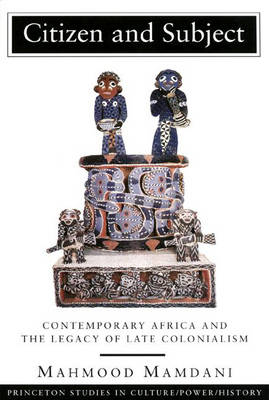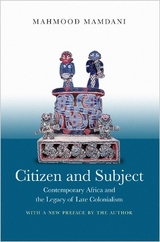
Citizen and Subject
Contemporary Africa and the Legacy of Late Colonialism
Seiten
1996
Princeton University Press (Verlag)
978-0-691-01107-3 (ISBN)
Princeton University Press (Verlag)
978-0-691-01107-3 (ISBN)
- Titel erscheint in neuer Auflage
- Artikel merken
Zu diesem Artikel existiert eine Nachauflage
In analysing the obstacles to democratisation in post-independence Africa, Mahmood Mamdani offers a bold, insightful account of colonialism's legacy - a bifurcated power that mediated racial domination through tribally organised local authorities, reproducing racial identity in citizens and ethnic identity in subjects. Many writers have understood colonial rule as either "direct" (French) or "indirect" (British), with a third variant - apartheid - as exceptional. This benign terminology, Mamdani shows, masks the fact that these were actually variants of a despotism. While direct rule denied rights to subjects on racial grounds, indirect rule incorporated them into a "customary" mode of rule, with state-appointed Native Authorities defining custom. By tapping authoritarian possibilities in culture, and by giving culture an authoritarian bent, indirect rule (decentralised despotism) set the pace for Africa; the French followed suit by changing from direct to indirect administration, while apartheid emerged relatively later. Apartheid, Mamdani shows, was actually the generic form of the colonial state in Africa.
Through case studies of rural (Uganda) and urban (South Africa) resistance movements, we learn how these institutional features fragment resistance and how states tend to play off reform in one sector against repression in the other. Reforming a power that institutionally enforces tension between town and country, and between ethnicites, is the key challenge for anyone interested in democratic reform in Africa.
Through case studies of rural (Uganda) and urban (South Africa) resistance movements, we learn how these institutional features fragment resistance and how states tend to play off reform in one sector against repression in the other. Reforming a power that institutionally enforces tension between town and country, and between ethnicites, is the key challenge for anyone interested in democratic reform in Africa.
Mahmood Mamdani received his Ph.D. in Government from Harvard University and is the founding Director of the Centre for Basic Research in Kampala. A Fellow of the African Academy of Sciences, he is the author of The Myth of Population Control and Politics and Class Formation in Uganda.
| Reihe/Serie | Princeton Studies in Culture/Power/History |
|---|---|
| Verlagsort | New Jersey |
| Sprache | englisch |
| Maße | 152 x 229 mm |
| Gewicht | 680 g |
| Themenwelt | Sozialwissenschaften ► Politik / Verwaltung ► Politische Systeme |
| Sozialwissenschaften ► Politik / Verwaltung ► Staat / Verwaltung | |
| ISBN-10 | 0-691-01107-9 / 0691011079 |
| ISBN-13 | 978-0-691-01107-3 / 9780691011073 |
| Zustand | Neuware |
| Informationen gemäß Produktsicherheitsverordnung (GPSR) | |
| Haben Sie eine Frage zum Produkt? |
Mehr entdecken
aus dem Bereich
aus dem Bereich
wie ich versuchte, Italienerin zu werden
Buch | Hardcover (2024)
Droemer (Verlag)
23,00 €



